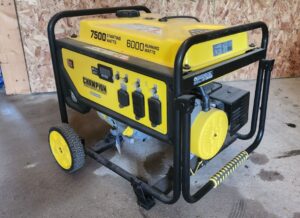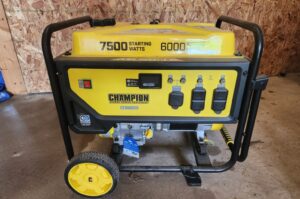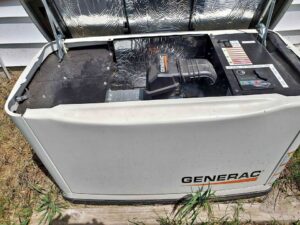Are you a mobile homeowner looking for a reliable source of power during extended power outages or emergencies? Look no further than mobile home generators. These generators are specifically designed to provide power to mobile homes when the power grid is down, ensuring your comfort and safety. In this article: Power Your Mobile Home: Best Generator we will discuss all the generator options available.
Power Your Mobile Home with a Generator
Portable home generators are a popular choice for mobile homeowners as they can be easily moved from one location to another. With options such as inverter generators and solar generators, you can also choose an environmentally friendly option that meets your needs.
Looking for a great generator to power your mobile home in any condition? Try out these options, many different prices, shipped directly to your doorstep.
For those seeking a more permanent solution, home backup generators like Generac home backup generators are a reliable source of power during extended outages. These standby generators automatically turn on when the power goes out, providing uninterrupted electricity until the grid is restored.
Choosing the right generator for your mobile home can be overwhelming, but it doesn’t have to be. Consider factors such as fuel type, wattage requirements, and noise level before making your decision. And don’t forget about maintenance – regular servicing by professionals will ensure your generator is always ready when you need it.
Learn how to save 70% on your electricity visit this link today
Types of Generators For a Mobile Home: including low-fuel consuming and silent options
Mobile homes are becoming increasingly popular as people seek to live a more nomadic lifestyle. However, one challenge that comes with living in a mobile home is ensuring you have a reliable source of power. This is where mobile home generators come in handy. In this article, we will explore the different types of generators available for mobile homes, including low-fuel consuming and silent options.
Fuel Options
There are four main types: diesel, gasoline, natural gas, and liquid propane. Diesel and gasoline generators are the most common types used in mobile homes due to their availability and affordability. However, natural gas and liquid propane generators have larger fuel capacity than gasoline generators which makes them ideal for longer periods of use.
Low-Fuel Consuming Generators
Low-fuel consuming generators are ideal for mobile homes with refrigerators and other appliances that require constant power supply. These types of generators consume less fuel compared to other models while still providing adequate power output. They also tend to be more energy-efficient which means they can save you money on your fuel expenses in the long run.
Silent Generator Options
Noise pollution can be a major issue. Fortunately, there are now silent generator options available on the market specifically designed for use in small spaces such as those found in mobile homes. These models operate at much lower decibels than traditional models making them perfect for those who value peaceful surroundings.
Other Types of Generators
Aside from low-fuel consuming and silent generator options, there are several other types of generator models available on the market today that can be used in mobile homes:
Inverter Generators – these models provide stable electricity flow by converting DC power into AC power.
Standby Generators – these units automatically turn on when the power goes out and can provide backup power for days at a time.
Hybrid Generators – these models combine the benefits of both electric and fuel-based generators to provide reliable power supply in all conditions.
Feasibility of Using a Generator to Power a Mobile Home
Mobile homes are a great way to enjoy the freedom of living on the road, but they require a reliable source of power to keep appliances and electronics running smoothly. While some mobile homes may be connected to electrical grids, many owners prefer the flexibility and independence that comes with using a generator. In this article, we’ll discuss the feasibility of using a generator to power your mobile home.
Generator Size for Powering a Mobile Home
The first thing to consider when selecting a generator for your mobile home is its size. The minimum output recommended for powering a mobile home is 3,500 watts, but larger homes may require generators with higher outputs. It’s important to assess your energy needs and choose an appropriately sized generator.
Fuel Sources for Generators
Another factor to consider when selecting a generator is the fuel source. There are three main types of fuel sources: gasoline, propane, and diesel. Gasoline-powered generators are more affordable than other options but can be noisy and emit fumes. Propane-powered generators are quieter and cleaner-burning than gasoline models but may be more expensive upfront. Diesel-powered generators are the most efficient option but tend to be more expensive overall.
Noise Level Considerations
Noise level is another important consideration when choosing a generator for your mobile home. Loud generators can disturb neighbors or make it difficult to sleep at night. Look for models with noise levels below 60 decibels (dB) if you plan on operating it near others.
Safety Precautions While Operating Generators
Generators can pose safety risks if not used properly, so it’s essential to follow all safety precautions while operating them in your mobile home. Never operate your generator indoors or in enclosed spaces as this can lead to carbon monoxide poisoning. Always ensure that there is proper ventilation around the unit before starting it up.
Cost Considerations
Lastly, you’ll need to consider the cost of purchasing and operating a generator for your mobile home. Prices for generators can vary widely based on their size, fuel source, and features. You’ll also need to factor in the cost of fuel and ongoing maintenance.
Learn how to save 70% on your electricity visit this link today
Wattage Needed to Power a Mobile Home
Mobile homes have different power requirements compared to traditional homes. The wattage needed to power a mobile home depends on its size and power needs. During a power outage, a mobile home may need a generator with higher wattage than its utility power.
Power Requirements For Mobile Homes
A typical mobile home has an average size of 1,000 square feet and requires around 3,000-4,000 watts of electricity to run most basic appliances like lights, refrigerator, TV, and air conditioning unit. However, if you have larger appliances or more advanced technology in your home such as an electric stove or central heating system, you will need more wattage.
Do you need to know how to measure your mobile home. Visit our article on How to Measure a Mobile Home.
Wattage Needed During a Power Outage
During a blackout or natural disaster when the grid goes down, you will need backup electricity to keep your essential systems running. A generator with at least 5,000 watts can power most of the appliances in your mobile home including air conditioning units and refrigerators. If you live in an area prone to severe weather conditions such as hurricanes or tornadoes that cause extended blackouts or outages lasting several days or weeks, consider investing in generators with higher KW ratings that can provide enough energy to run your whole house.
Choosing the Right Generator For Your Needs
When choosing the right generator for your needs there are several factors to consider such as fuel type (gasoline vs propane), portability (stationary vs portable), noise level (decibel rating), and price range. You can use online calculators or consult with experts in-store to help determine the correct wattage for your specific situation.
Read our article on The Average Electric Bill for a Mobile Home.
Properly Connecting a Generator to a Mobile Home in Six Steps
Safety should always come first. Following the right procedures can prevent accidents and ensure that your electrical system functions properly. Here are six steps to help you connect your generator safely and successfully.
Step 1: Turn off the main breaker
Before you start connecting your generator, make sure that the main breaker is turned off. This will prevent any electricity from flowing into your home while you work on the connection.
Step 2: Choose the right gauge of wire
The next step is to choose the right gauge of wire for your electrical system. The size of wire you need will depend on the wattage of your generator and the length of cable required. Using an undersized wire can cause overheating or even fire hazards.
Step 3: Connect the wires properly
Once you have chosen the correct gauge of wire, it’s time to connect it properly. Make sure that all connections are tight and secure before turning on the power supply. A loose connection can cause damage to both your generator and electrical system.
Step 4: Install a transfer switch
To protect against backfeeding, install a transfer switch between your mobile home’s electrical panel and generator. This device ensures that power flows only one way – from your generator into your mobile home – preventing damage or injury caused by reverse flow of electricity.
Step 5: Test run
After installing everything correctly, test run everything before using it as backup power during emergencies. You might want to check if all appliances are working correctly with no voltage fluctuations or surges.
Step 6: Maintenance
Lastly, do not forget about maintenance! Regular inspections and maintenance checks will keep everything up-to-date with no unexpected surprises when emergency strikes.
Read our article on Are Mobile Homes Safe?
Portable Generator Safety Tips
Portable generators are a great backup power source in case of a power outage. However, it’s crucial to use them correctly to avoid hazards such as fire and carbon monoxide poisoning. Here are some safety tips to keep in mind when using portable generators:
Always Place Portable Generators Outside and Away from Doors, Windows, and Vents.
It’s essential to place the generator outside because it produces carbon monoxide gas that can be lethal when inhaled in large amounts. Carbon monoxide is odorless and colorless, so you won’t know if you’re inhaling it until it’s too late. Therefore, never place the generator inside your house or garage, even if the doors and windows are open.
Make sure that the generator is at least 20 feet away from any doors, windows, or vents. This distance will ensure that any exhaust fumes won’t enter your home through these openings.
Use a Battery-Operated Carbon Monoxide Detector When Running a Portable Generator.
A carbon monoxide detector is an inexpensive device that can save lives. It alerts you when there’s a dangerous level of carbon monoxide gas in the air so that you can evacuate immediately. Make sure that the detector has fresh batteries before starting the generator.
Never Refuel a Hot Portable Generator or Spill Fuel on It.
Refueling a hot generator can cause fuel vapors to ignite and create a fire hazard. Therefore, turn off the generator and let it cool down for at least 15 minutes before refueling it.
Also, make sure not to spill fuel on the generator or its surroundings because gasoline is highly flammable. If you accidentally spill fuel on the generator, wipe it up immediately with a clean rag.
Check the Fuel Gauge Regularly to Avoid Running out of Fuel While Using a Backup Generator.
Running out of fuel while using a backup generator can cause damage to appliances and electronics connected to it. Therefore, check the fuel gauge regularly and refill the generator before it runs out of fuel.
Standby Generators are Safer than Portable Generators Because They are Permanently Installed and Connected to the Home’s Electrical System.
Standby generators are safer than portable generators because they’re permanently installed outside your home and connected directly to your electrical system. They automatically turn on when there’s a power outage and turn off when the power is restored. Unlike portable generators, standby generators don’t produce carbon monoxide gas because they’re installed outside.
Cost vs Budget: Finding the Right Balance for a Mobile Home Generator
Finding the right balance between cost and budget is crucial. The cost of a generator can vary depending on its capacity, BTUs, and brand. However, investing in a higher cost generator may save you money in the long run with more efficient operation and less maintenance work.
Consider Your Camping or RV Needs
Before making a purchase, consider your camping or RV needs to determine the best capacity and BTUs for your generator. If you have a smaller RV or plan on using your generator for shorter trips, then a lower capacity generator may suffice. On the other hand, if you have a larger RV or plan on extended camping trips, then investing in a higher capacity generator may be necessary.
Goal Zero Offers Affordable Options
For those on a tight budget, Goal Zero offers affordable options that are perfect for small camping trips or powering small appliances in your RV. However, these generators may not be the best fit for larger RVs or extended camping trips as they have limited capacities and lower BTUs.
Investing in Higher Cost Generators
Investing in higher cost generators from reputable brands such as Honda or Yamaha may save you money in the long run with more efficient operation and less maintenance work. These generators often come with advanced features such as fuel efficiency modes that can help reduce fuel consumption over time.
Some higher-end models come equipped with noise reduction technology which makes them quieter than other models. This feature can be especially beneficial when camping in areas where noise restrictions are enforced.
How Much Will It Cost to Install a New Generator?
The cost of installing a new mobile home generator varies depending on several factors such as location and type of generator. On average, homeowners can expect to pay anywhere from $3,500 to $6,000 for installation costs alone.
It’s important to note that the cost of installation should also be factored into your overall budget when purchasing a new generator. It’s recommended to consult with a professional electrician or generator installer to get an accurate estimate for installation costs.
Benefits of Onsite Power Generation Systems for a Mobile Home
In conclusion, having an onsite power generation system for your mobile home provides numerous benefits. You can choose from various types of generators, including low-fuel consuming and silent options that are feasible to use. Knowing the wattage needed to power your mobile home is crucial as well as properly connecting the generator in six steps. Following portable generator safety tips is essential.
Finding the right balance between cost and budget is also important when selecting a mobile home generator. By investing in an onsite power generation system, you can ensure reliable and consistent electricity supply while enjoying the flexibility of being able to move around with your home.
Power Your Mobile Home Generator: Conclusion
Overall, having a mobile home generator gives you peace of mind knowing that you have backup power during emergencies or when camping off-grid. So go ahead and explore your options for a mobile home generator today!
FAQ’s: Power Your Mobile Home
How do I power my mobile home?
You can power your mobile home through connections to a local electrical grid or by using alternative power sources such as generators or solar panels. Mobile homes typically have electrical panels and wiring to distribute power to appliances and lighting.
How does a mobile home get power?
A mobile home gets power by connecting to the local electrical grid through an electrical hookup or pedestal. It can also utilize alternative power sources like generators or solar panels if properly equipped.
Can you run a mobile home off a generator?
Yes, you can run a mobile home off a generator. Many mobile homes are equipped with electrical systems that can be connected to a generator during power outages or in areas where grid power is not available. However, the generator’s capacity should be sufficient to meet the home’s power needs.
How much power does it take to run a mobile home?
The power requirements for a mobile home can vary widely depending on factors such as the size of the home, the number and types of appliances, and heating and cooling systems. On average, a mobile home may require 100-200 amps of electrical service, but the specific power needs can be determined by an electrician based on the home’s individual setup and usage.
You might also be interested in our article: Solar Panels for Mobile Homes.




